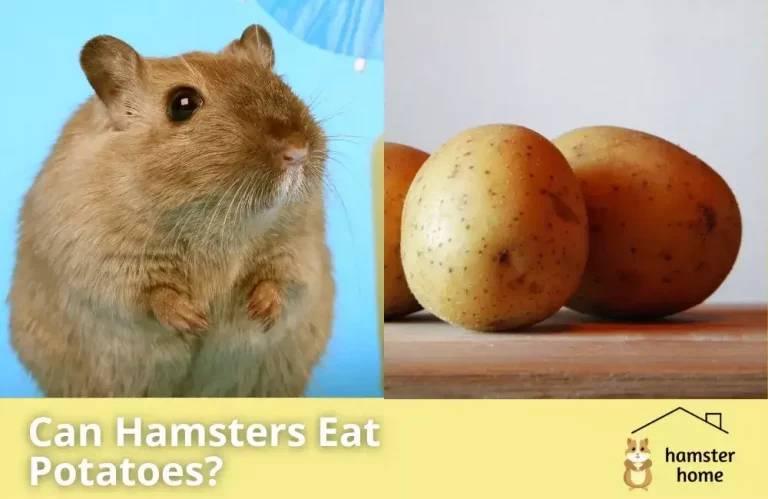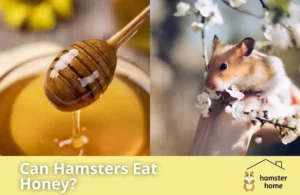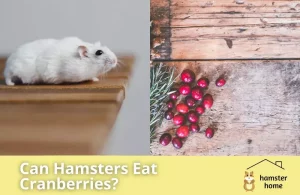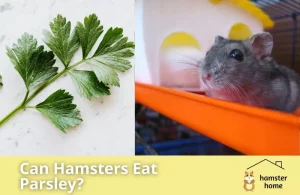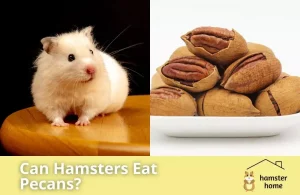Is it safe to feed potatoes to hamsters? Yes, your hamster can eat and adequately digest potatoes like other fresh vegetables. You will be glad to know that potatoes are a perfectly safe treat for your hamster. However, it should only be given as an occasional snack to avoid adverse effects. Proper supervision is advised while hamsters have this treat.
Before you feed one, you must have a sound knowledge of hamsters’ bodies and potato composition. Therefore, we have done some homework and gathered all the information you need:
Benefits of Potatoes for your Hamster
Potatoes are a rich source of Potassium, Vitamin B6, and Vitamin C. In addition, they also contain proteins, fiber, fats, and carbs. Potatoes are low in calories, although they constitute a rich quantity of starchy carbs, which are considered an instant energy source. However, this energy cannot be stored and converted into fats. Boiled potato with skin is a good source of fiber which stimulates normal bowel function and keep the gut in good shape.
Another great advantage of giving your hammy potato as a treat is that it is commonly available everywhere and economical. Lastly, it is nearly effortless to prepare as only a few minutes are required to boil or roast potatoes.
Guidelines and Risks Associated with Feeding Potatoes to Hamsters
Never give your hamster seasoned or fried potatoes as they are unsafe for your little hamster’s gut and lead to dehydration and obesity. Additionally, only feed boiled, baked, or roasted potatoes to your hammy. In addition, raw potatoes are also not safe for hamsters as they contain solanine, a deadly toxin that can be fatal for small mammals, including hamsters.
Make sure that potatoes have been cooled down before being served to your hamsters because hot potatoes can harm your hamster. It is advised not to remove the skin as it has high fiber content, beneficial for your hammy. Always introduce new food slowly and observe the reaction of your hamster. If your furry friend enjoys the snack, feed in a restrained amount. If the hamster doesn’t show any interest, don’t try forcing it.
If your pet shows signs of poor digestion, then stop feeding potatoes as it can worsen the situation. If your hammy has some medical history, it is preferable to consult with a vet before providing it potatoes. Hamsters with obesity and diabetes should not be fed potatoes. Apart from this, baby and senior hamsters are vulnerable to potatoes, and that is why you should not consider giving them potatoes even as a treat.
How Should Potatoes be Fed to Hamsters?
Preferably, a quarter cup of boiled potatoes every couple of weeks is enough for your hamster. Do not peel the skin because it is good for your pet. Only feed cooked potatoes (boiled, roasted, or baked). Boiled potatoes are preferable because they retain the maximum amount of nutrients compared to roasted or baked potatoes.
If you are feeding your hammy potatoes for the first time, you can give them in mashed form because it would be easy for her to consume. Lastly, ensure that you remove the remains of the potatoes that can start rotting in the enclosure, causing mold and bacteria to grow, consequently causing health hazards to your hamsters.
FAQs
You may have wondered what could be alternative treats for your hammy other than potatoes if potatoes do not suit your hamster. Your hamster can have cereals or grains, provided they are sugar-free, Peas, Cucumber, Roman lettuces, and Carrots instead of potatoes but only as a treat.
Dwarf hamsters like Campbell and Chinese hamsters are relatively smaller than average hamsters. Hence they have a smaller and fragile gut. So, it is not advisable to give them high-carb food like potatoes, making them obese and vulnerable to diabetes.
No, it would be a horrible idea to give your hammy French fries as they are fried and seasoned, resultantly fatal for your hamster.
Hamsters and Potatoes Explained
Your hammy can have a potato treat but in a controlled amount and frequency and under strict supervision. If your pet shows any anomaly after having potatoes consult with a vet. As a responsible owner, you should know what’s good for your pet and what can cause trouble for her. That being said, you should observe the effects of everything its eats.
It is advised not to experiment with its diet unnecessarily and always consult with a vet before making any change. They are very fragile creatures, so they should be dealt with with care and affection.

